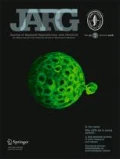Abstract
Objective
Herein we analyzed FSH-R polymorphism at position 307 aiming (a) to assess the prevalence of the three allelic variants (Ala307Ala, Ala307Thr and Thr307Thr) in relation to the type of ovary and (b) to clarify if the allelic variant could influence the responsiveness to exogenous FSH.
Study design
We prospectively studied a group of 106 Italian women undergoing in vitro fertilization (IVF), among which 40 were subjects with polycystic ovary syndrome (PCOS) and 66 were normo-ovulatory women with a normal ovarian morphology at transvaginal ultrasound. DNA extraction, denaturing high-performance liquid chromatography (dHPLC) and DNA sequencing were used to detect the FSH-R 307 polymorphic genotype and the whole exon 10 was analyzed.
Results
The heterozygote variant Ala307Thr was significantly more frequent than the homozygote variants in women with PCOS, whereas in normo-ovulatory women with normal ovary the three allelic variants had a comparable prevalence. Women bearing the Ala307Thr variant showed a higher ovarian responsiveness to exogenous FSH than normo-ovulatory subjects.
Conclusions
The heterozygote FSH-R polymorphism Ala307Thr is significantly more frequent in women with PCOS than in normo-ovulatory subjects and is more frequently associated with a higher ovarian responsiveness to exogenous FSH.
Similar content being viewed by others
References
Simoni M, Nieschlag E, Gromoll J. Isoforms and single nucleotide polymorphisms of the FSH receptor gene: implications for human reproduction. Hum Reprod Update. 2002;8:413–21.
Lussiana C, Guani B, Mari C, Restagno G, Massobrio M, Revelli A. Mutations and polymorphisms of the FSH Receptor (FSHR) Gene. Clinical implications in female fecundity and molecular biology of FSHR protein and gene. Obstet Gynecol Survey. 2008;63:785–95.
Mohiyiddeen L, Nardo LG (2010) Single-nucleotide polymorphisms in the FSH receptor gene and ovarian performance: Future role in IVF. Hum Fertil (Camb). [Epub ahead of print].
Perez MM, Gromoll J, Behre HM, Grassner C, Nieschlag E, Simoni M. Ovarian response to follicle-stimulating hormone (FSH) stimulation depends on the FSH receptor genotype. J Clin Endocrinol Metab. 2006;85:3365–9.
Jun JK, Joon JS, Ku SY, Min Choi Y, Hwang KR, Park SY, et al. Follicle-stimulating hormone receptor gene polymorphism and ovarian response to controlled ovarian hyperstimalation for IVF-ET. J Hum Genet. 2006;51:665–70.
Loutradis D, Patsoula E, Minas V, Koussidis GA, Antsaklis A, Michalas S, et al. FSH receptor gene polymorphisms have a role for different ovarian response to stimulation in patients entering IVF/ICSI-ET programs. J Assist Reprod Gen. 2006;23:177–84.
Wunsch A, Sonntag B, Simoni M. Polymorphism of the FSH receptor and ovarian response to FSH. Ann Endocrinol (Paris). 2007;68:160–6.
Achrekar SK, Modi DN, Desai SK, Mangoli VS, Mangoli RV. Smita D. Mahale Follicle-stimulating hormone receptor polymorphism (Thr307Ala) is associated with variable ovarian response and ovarian hyperstimulation syndrome in Indian women. Fertil Steril. 2009;91:432–9.
Laven JS, Mulders AG, Suryandari DA, Gromoll J, Nieschlag E, Fauser BC, et al. Follicle-stimulating hormone receptor polymorphisms in women with normogonadotropic anovulatory infertility. Fertil Steril. 2003;80:986–92.
Sudo S, Kudo M, Wada S, Sato O, Hsueh AJ, Fujimoto S. Genetic and functional analyses of polymorphisms in the human FSH receptor gene. Mol Hum Reprod. 2002;8:893–9.
Du J, Zhang W, Guo L, Zhang Z, Shi H, Wang J, Zhang H, Gao L, Feng G, He L (2010) Two FSHR variants, haplotypes and meta-analysis in Chinese women with premature ovarian failure and polycystic ovary syndrome. Mol Genet Metab. [Epub ahead of print]
Unsal T, Konac E, Yesilkaya E, Yilmaz A, Bideci A, Ilke Onen H, et al. Genetic polymorphisms of FSHR, CYP17, CYP1A1, CAPN10, INSR, SERPINE1 genes in adolescent girls with polycystic ovary syndrome. J Assist Reprod Genet. 2009;26:205–16.
Valkenburg O, Uitterlinden AG, Piersma D, Hofman A, Themmen AP, de Jong FH, et al. Genetic polymorphisms of GnRH and gonadotrophic hormone receptors affect the phenotype of polycystic ovary syndrome. Hum Reprod. 2009;8:2014–22.
Gromoll J, Brocker M, Derwahl M, Hoeppner W. Detection of mutations in glycoprotein hormone receptors. Methods. 2000;21:83–97.
Kene PS, Dighe RR, Mahale SD. Delineation of regions in the extracellular domain of follicle-stimulating hormone receptor involved in hormone binding and signal transduction. Am J Reprod Immunol. 2005;54:38–48.
Kuijper EA, Blankenstein MA, Luttikhof LJ, Roek SJ, Overbeek A, Hompes PG, Twisk JW, Lambalk CB (2010) Frequency distribution of polymorphisms in the FSH receptor gene in infertility patients of different ethnicity. Reprod Biomed Online [Epub ahead of print]
Abbott DH, Dumesic DA, Franks S. Developmental origin of polycystic ovary syndrome—a hypothesis. J Endocrinol. 2002;4:1–5.
Author information
Authors and Affiliations
Corresponding author
Additional information
Capsule FSH-receptor Ala307Thr polymorphism is associated to PCOS and to high responsiveness to exogenous FSH.
Rights and permissions
About this article
Cite this article
Dolfin, E., Guani, B., Lussiana, C. et al. FSH-receptor Ala307Thr polymorphism is associated to polycystic ovary syndrome and to a higher responsiveness to exogenous FSH in Italian women. J Assist Reprod Genet 28, 925–930 (2011). https://doi.org/10.1007/s10815-011-9619-4
Received:
Accepted:
Published:
Issue Date:
DOI: https://doi.org/10.1007/s10815-011-9619-4




